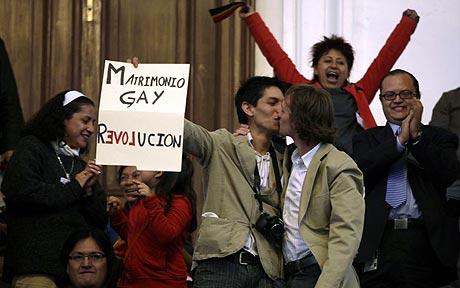Legally sanctioned same-sex marriage has been sweeping the Western world for the past fifteen years, after first being enacted in 2001 in the Netherlands.
With one possible exception (South Africa), all the countries which have instituted same-sex marriage could be classified as Western nations. (By “Western nations,” I refer to nations of Western Europe and the settler nations deriving from them.)
Same-sex marriage has not been enacted in Eastern Europe, Asia or Africa (with the exception of South Africa).
Same-sex marriage is a radical legal innovation. Nobody knows where it’s going to lead and what sorts of situations it’s going to bring about.
It’s a radical legal innovation strongly supported by the media elite of the Western world. As a result, the real issues and their ramifications aren’t being properly discussed. Critics of the same-sex marriage agenda aren’t getting a fair hearing and some have found themselves in economic and legal problems.
First, a few points are in order. It’s relevant to point out that in Mexico, civil marriages performed by the state are the only legally-recognized marriages. Church weddings are not recognized by the state. So couples who get married in a church get married in a civil wedding first. Furthermore, marriages are handled on the state level, but as we shall see, the Mexican Supreme Court has made a hash of that.

The Distrito Federal and several Mexican states have adopted measures legalizing same sex marriage. (PHOTO: telegraph.co.uk)
The first legal entity to institute full same-sex marriage in Mexico was the Distrito Federal, the Federal District, that is, Mexico City. It was passed by the district’s legislative assembly during the final days of December 2009 and came into effect in 2010. Later that year the Mexican Supreme Court upheld that decision and declared that same-sex marriages performed in Mexico City were valid throughout the country. (Mexico has a “full faith and credit” clause in its Constitution as does the U.S.A.)
By June 2015, two Mexican states had enacted same-sex marriage: Quintana Roo (by order of the state’s Secretary of State) and Coahuila (passed by the state legislature).
It was in June 2015 that the Mexican Supreme Court ruled definitively for same-sex marriage in the entire country. (That was the same month as the announcement of the analogous Obergefell ruling by the U.S. Supreme Court.)
In June 2015, the Mexican Supreme Court ruled that all state prohibitions of same-sex marriage were unconstitutional. This ruling did not technically overturn these state bans, but it did declare them unconstitutional and it did allow same-sex couples the right to be married through the use of individual injunctions. So in effect, regardless of what state laws might say, this decision made same-sex marriage the law of the land in all of Mexico.
The latest development was an announcement by President Enrique Peña Nieto on May 17th, 2016, the “International Day Against Homophobia and Transphobia.” President Peña Nieto announced that he had begun a process to amend the Constitution of Mexico to specify same-sex marriage in that document.
It’s still not a done deal, however, as an amendment to the Mexican Constitution requires a majority of two-thirds in Congress and the ratification of the amendment by a majority of Mexico’s 31 states.
There is opposition.
The Mexican Catholic Church objects, affirming that same-sex marriage “cannot be equated with the marriage of a man and a woman.” Mexican bishops have called for Mexican legislators to “study carefully the effects of same-sex unions on society.”
Hugo Valdemar, spokesman for the Mexico City Catholic Archdiocese, called on legislators to oppose the reform. Valdemar said that “Marriage has some very concrete aims which, of course, two people of the same sex do not fulfill.”
Peña Nieto has also called for full-fledged adoption by gay couples, which would involve a reform of the civil code.
Spain, Argentina and Uruguay are other Spanish-speaking countries with same-sex marriage. The Constitutional Court of Colombia recently legalized it and it’s soon to take effect. The autonomous U.S. island territory of Puerto Rico also has it.
Note: On May 19th I was a guest of Silvio Canto, Jr. on his CANTO TALK show. We discussed same-sex marriage in Mexico, the Chapo Guzman situation, NAFTA, and of course Donald Trump and Mexico. You can listen to the interview here.
By Allan Wall for TYT
——————————
Allan Wall, an educator, resided in Mexico for many years. His website is located at http://www.allanwall.info.



